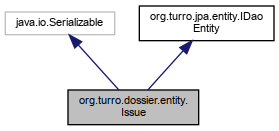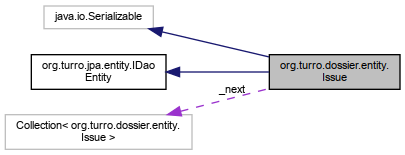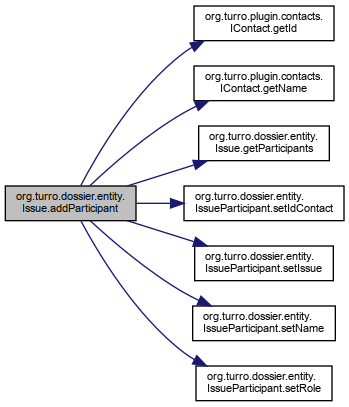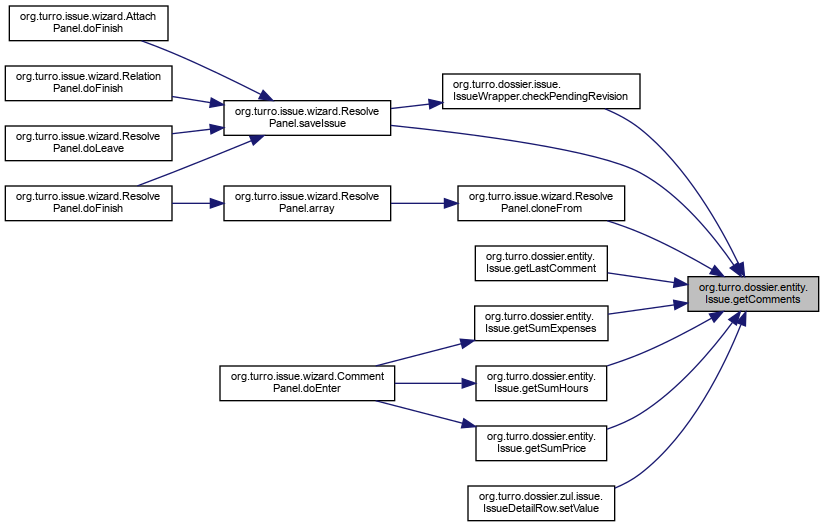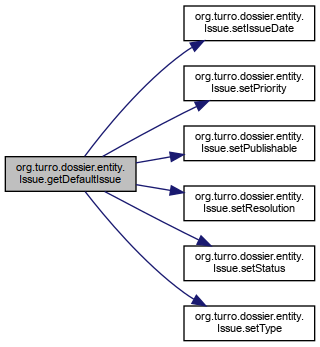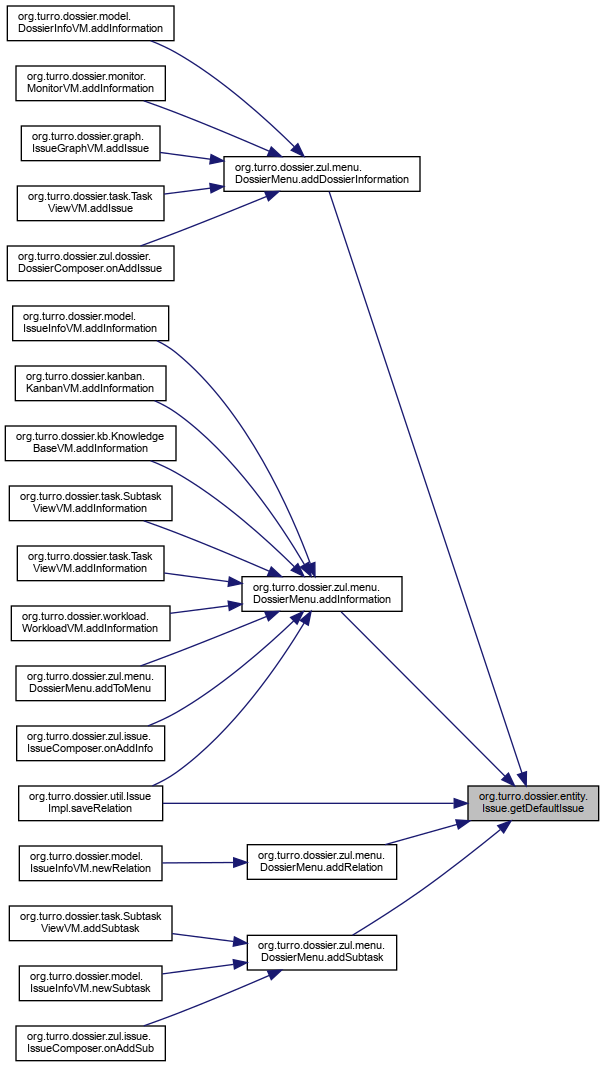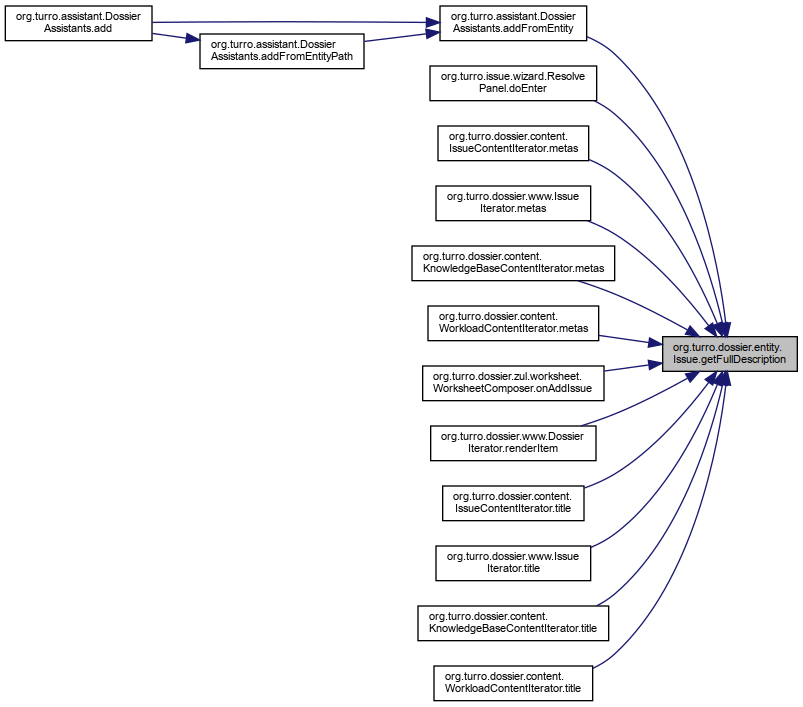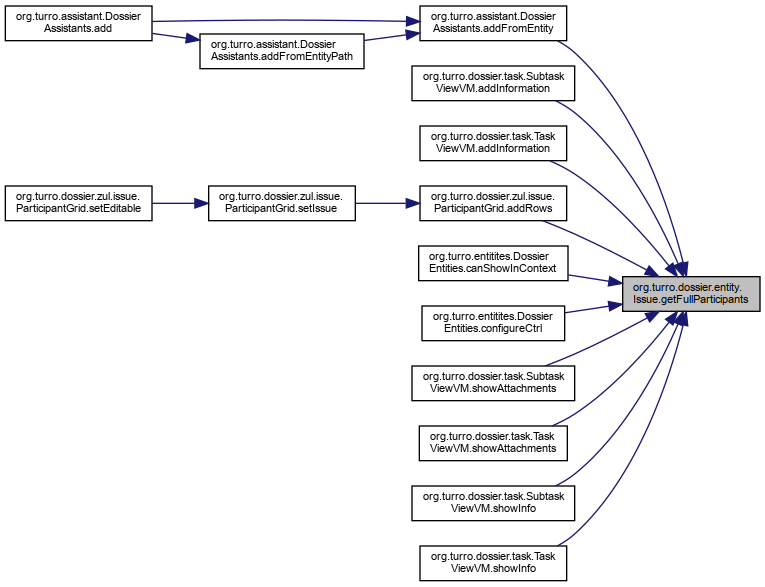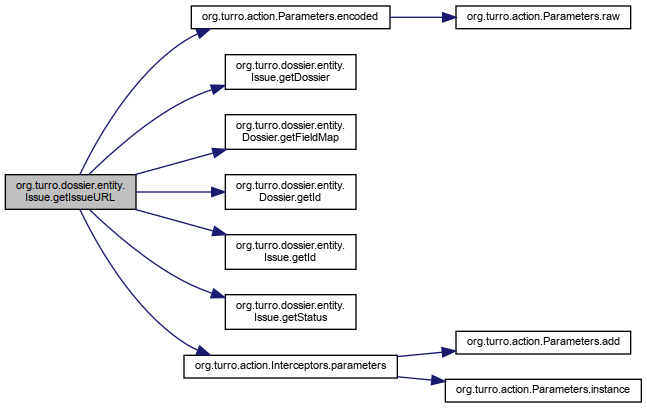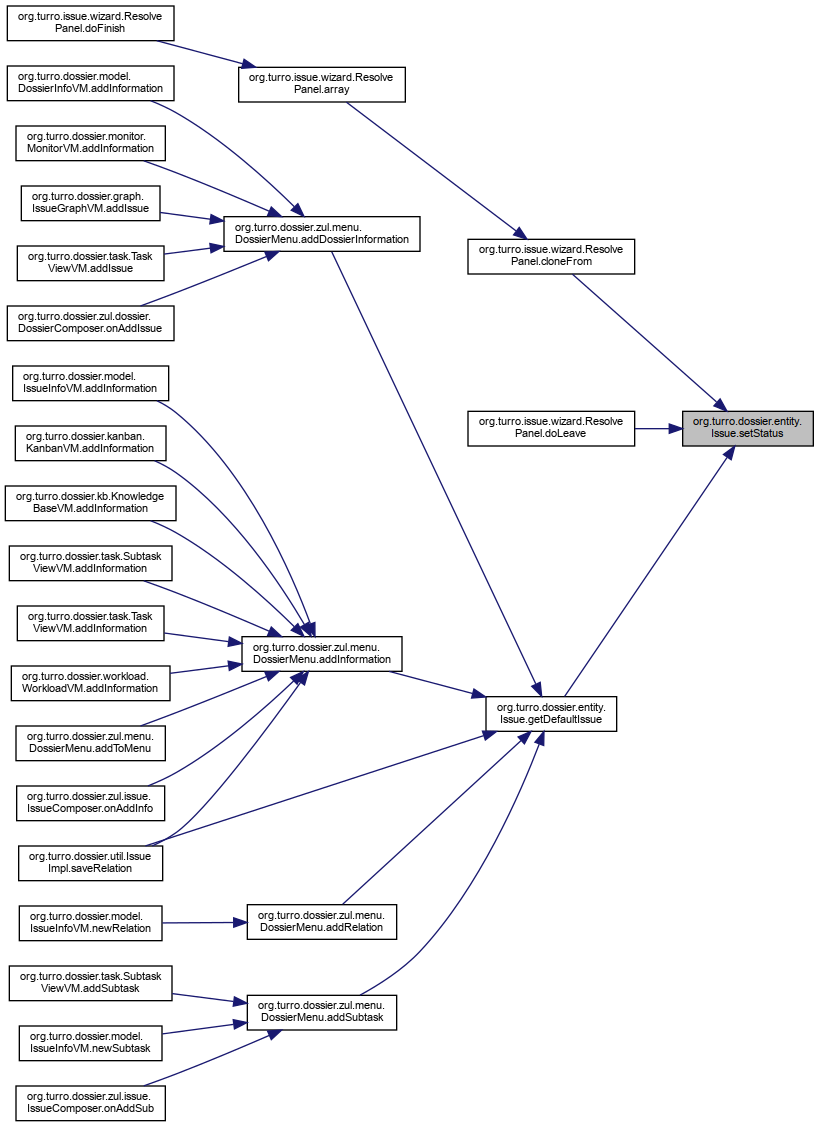- Author
- Lluis Turró Cutiller lluis.nosp@m.@tur.nosp@m.ro.or.nosp@m.g
Definition at line 44 of file Issue.java.
◆ addParticipant() [1/2]
Definition at line 432 of file Issue.java.
433 if(contact ==
null)
return null;
434 IssueParticipant ip =
new IssueParticipant();
436 ip.setIdContact(contact.getId());
437 ip.setName(contact.getName());
Set< IssueParticipant > getParticipants()
◆ addParticipant() [2/2]
Definition at line 427 of file Issue.java.
428 if(
id ==
null)
return null;
IssueParticipant addParticipant(String id, IssueParticipantRole role)
◆ addQA() [1/2]
◆ addQA() [2/2]
Definition at line 409 of file Issue.java.
410 IContact c = Contacts.getEmpty();
411 c.setContact(contact);
◆ addReporter() [1/2]
◆ addReporter() [2/2]
Definition at line 397 of file Issue.java.
398 IContact c = Contacts.getEmpty();
399 c.setContact(contact);
◆ addResponsible() [1/2]
◆ addResponsible() [2/2]
| IssueParticipant org.turro.dossier.entity.Issue.addResponsible |
( |
Object |
contact | ) |
|
Definition at line 403 of file Issue.java.
404 IContact c = Contacts.getEmpty();
405 c.setContact(contact);
◆ entityId()
| Object org.turro.dossier.entity.Issue.entityId |
( |
| ) |
|
◆ getBodyIssues()
| Collection<Issue> org.turro.dossier.entity.Issue.getBodyIssues |
( |
| ) |
|
Definition at line 532 of file Issue.java.
534 Dao dao =
new DossierPU();
535 _body = dao.getResultList(
536 "select distinct ip.target from IssuePredecessor ip " +
537 "where ip.source = ? " +
539 new Object[] {
this, IssuePredecessorType.START_WHEN_STARTS });
◆ getBodyPercentDone()
| double org.turro.dossier.entity.Issue.getBodyPercentDone |
( |
| ) |
|
Definition at line 544 of file Issue.java.
546 if(!_body.isEmpty()) {
548 for(Issue i : _body) {
549 if(i.getStatus().isFinished()) {
553 return new Round(d / ((
double) _body.size()) * 100.0).decimals(2).value();
Collection< Issue > getBodyIssues()
◆ getComments()
| Set<IssueComment> org.turro.dossier.entity.Issue.getComments |
( |
| ) |
|
Definition at line 122 of file Issue.java.
123 Dao dao =
new DossierPU();
124 if(
id !=
null &&
id > 0 && dao.isNotLoaded(comments)) {
125 comments = dao.lazyLoader(Issue.class,
this,
"comments").comments;
◆ getControlDate()
| Date org.turro.dossier.entity.Issue.getControlDate |
( |
| ) |
|
◆ getDefaultIssue()
| static Issue org.turro.dossier.entity.Issue.getDefaultIssue |
( |
| ) |
|
|
static |
Definition at line 503 of file Issue.java.
504 Issue i =
new Issue();
505 i.setType(IssueType.TYPE_TASK);
506 i.setStatus(IssueStatus.STATUS_NEW);
507 i.setPriority(IssuePriority.PRIORITY_HAS_WORKAROUND);
508 i.setResolution(IssueResolution.RESOLUTION_FIXED);
509 i.setIssueDate(
new java.util.Date());
510 i.setPublishable(
true);
◆ getDelivery()
| Date org.turro.dossier.entity.Issue.getDelivery |
( |
| ) |
|
◆ getDescription()
| String org.turro.dossier.entity.Issue.getDescription |
( |
| ) |
|
◆ getDossier()
| Dossier org.turro.dossier.entity.Issue.getDossier |
( |
| ) |
|
◆ getDuplicated()
| Issue org.turro.dossier.entity.Issue.getDuplicated |
( |
| ) |
|
◆ getDuplicates()
| Collection<Issue> org.turro.dossier.entity.Issue.getDuplicates |
( |
| ) |
|
Definition at line 384 of file Issue.java.
385 if(_duplicates ==
null) {
386 Dao dao =
new DossierPU();
387 _duplicates = dao.getResultList(
388 "select distinct i from Issue i " +
389 "where i.duplicated = ?",
390 new Object[] {
this });
◆ getExpenses()
| double org.turro.dossier.entity.Issue.getExpenses |
( |
| ) |
|
◆ getFullDescription() [1/2]
| String org.turro.dossier.entity.Issue.getFullDescription |
( |
| ) |
|
Definition at line 354 of file Issue.java.
String getFullDescription()
◆ getFullDescription() [2/2]
| String org.turro.dossier.entity.Issue.getFullDescription |
( |
boolean |
withSubject | ) |
|
Definition at line 358 of file Issue.java.
360 (dossier !=
null ? Chars.forward().spaced() + dossier.
getFullDescription(withSubject) :
"");
String getFullDescription()
◆ getFullParticipants()
Definition at line 461 of file Issue.java.
462 if(_participants ==
null) {
466 return _participants;
boolean addAll(Collection<? extends P > collection)
ParticipantSet< IDossierParticipant > getFullParticipants()
◆ getGrouping()
| String org.turro.dossier.entity.Issue.getGrouping |
( |
| ) |
|
◆ getHours()
| double org.turro.dossier.entity.Issue.getHours |
( |
| ) |
|
◆ getId()
| Long org.turro.dossier.entity.Issue.getId |
( |
| ) |
|
◆ getIssueDate()
| Date org.turro.dossier.entity.Issue.getIssueDate |
( |
| ) |
|
◆ getIssueParticipants()
◆ getIssueURL()
| String org.turro.dossier.entity.Issue.getIssueURL |
( |
| ) |
|
Definition at line 514 of file Issue.java.
518 .getOrDefault(
"issueClosedUrl",
"/app/frame?" + Interceptors.parameters(
"issue",
getId().toString()).encoded());
521 .getOrDefault(
"issueOpenUrl",
"/app/frame?" + Interceptors.parameters(
"issue",
getId().toString()).encoded());
524 .replaceAll(
"\\#IID",
getId() +
"");
Map< String, Object > getFieldMap()
◆ getLastComment()
| IssueComment org.turro.dossier.entity.Issue.getLastComment |
( |
| ) |
|
Definition at line 370 of file Issue.java.
371 IssueComment last =
null;
373 if(last ==
null || last.getModification().before(comment.getModification())) {
Set< IssueComment > getComments()
◆ getModification()
| Date org.turro.dossier.entity.Issue.getModification |
( |
| ) |
|
◆ getNextIssues()
| Collection<Issue> org.turro.dossier.entity.Issue.getNextIssues |
( |
| ) |
|
Definition at line 558 of file Issue.java.
560 Dao dao =
new DossierPU();
561 _next = dao.getResultList(
562 "select distinct ip.target from IssuePredecessor ip " +
563 "where ip.source = ? " +
564 "and ip.target.grouping = ip.source.grouping " +
566 new Object[] {
this, IssuePredecessorType.START_WHEN_ENDS });
◆ getParticipants()
◆ getPrice()
| double org.turro.dossier.entity.Issue.getPrice |
( |
| ) |
|
◆ getPriority()
◆ getRelated()
| RelatedItem org.turro.dossier.entity.Issue.getRelated |
( |
| ) |
|
◆ getResolution()
◆ getSerializerMappings()
| MappingSet org.turro.dossier.entity.Issue.getSerializerMappings |
( |
| ) |
|
Definition at line 573 of file Issue.java.
574 MappingSet
set =
new MappingSet();
575 set.addMapping(Dossier.class, 1,
576 new String[] {
"id" },
◆ getSolvedDate()
| Date org.turro.dossier.entity.Issue.getSolvedDate |
( |
| ) |
|
◆ getSources()
Definition at line 267 of file Issue.java.
268 Dao dao =
new DossierPU();
269 if(
id !=
null &&
id > 0 && dao.isNotLoaded(sources)) {
270 sources = dao.lazyLoader(Issue.class,
this,
"sources").sources;
◆ getStartDate()
| Date org.turro.dossier.entity.Issue.getStartDate |
( |
| ) |
|
◆ getStatus()
| IssueStatus org.turro.dossier.entity.Issue.getStatus |
( |
| ) |
|
◆ getSumExpenses()
| double org.turro.dossier.entity.Issue.getSumExpenses |
( |
| ) |
|
Definition at line 479 of file Issue.java.
482 r += c.getExpenses();
◆ getSumHours()
| double org.turro.dossier.entity.Issue.getSumHours |
( |
| ) |
|
◆ getSumPrice()
| double org.turro.dossier.entity.Issue.getSumPrice |
( |
| ) |
|
◆ getTargets()
Definition at line 279 of file Issue.java.
280 Dao dao =
new DossierPU();
281 if(
id !=
null &&
id > 0 && dao.isNotLoaded(targets)) {
282 targets = dao.lazyLoader(Issue.class,
this,
"targets").targets;
◆ getType()
| IssueType org.turro.dossier.entity.Issue.getType |
( |
| ) |
|
◆ getVersion()
◆ hasData()
| boolean org.turro.dossier.entity.Issue.hasData |
( |
| ) |
|
Definition at line 475 of file Issue.java.
476 return expenses != 0 || hours != 0 || price != 0;
◆ isEmpty()
| boolean org.turro.dossier.entity.Issue.isEmpty |
( |
| ) |
|
◆ isKnowledgeBase()
| boolean org.turro.dossier.entity.Issue.isKnowledgeBase |
( |
| ) |
|
Definition at line 363 of file Issue.java.
364 if(dossier !=
null) {
boolean isKnowledgeBase()
◆ isMilestone()
| boolean org.turro.dossier.entity.Issue.isMilestone |
( |
| ) |
|
◆ isPublishable()
| boolean org.turro.dossier.entity.Issue.isPublishable |
( |
| ) |
|
◆ removeParticipant()
Definition at line 443 of file Issue.java.
444 if(contact ==
null)
return null;
446 while(it.hasNext()) {
447 IssueParticipant ip = it.next();
448 if(ip.getIdContact().equals(contact.getId()) &&
449 ip.getRole().equals(role)) {
◆ setComments()
| void org.turro.dossier.entity.Issue.setComments |
( |
Set< IssueComment > |
comments | ) |
|
Definition at line 130 of file Issue.java.
131 this.comments = comments;
◆ setControlDate()
| void org.turro.dossier.entity.Issue.setControlDate |
( |
Date |
controlDate | ) |
|
Definition at line 138 of file Issue.java.
139 this.controlDate = controlDate;
◆ setDelivery()
| void org.turro.dossier.entity.Issue.setDelivery |
( |
Date |
delivery | ) |
|
Definition at line 146 of file Issue.java.
147 this.delivery = delivery;
◆ setDescription()
| void org.turro.dossier.entity.Issue.setDescription |
( |
String |
description | ) |
|
Definition at line 154 of file Issue.java.
155 this.description = description;
◆ setDossier()
| void org.turro.dossier.entity.Issue.setDossier |
( |
Dossier |
dossier | ) |
|
Definition at line 162 of file Issue.java.
163 this.dossier = dossier;
◆ setDuplicated()
| void org.turro.dossier.entity.Issue.setDuplicated |
( |
Issue |
duplicated | ) |
|
Definition at line 170 of file Issue.java.
171 this.duplicated = duplicated;
◆ setExpenses()
| void org.turro.dossier.entity.Issue.setExpenses |
( |
double |
expenses | ) |
|
Definition at line 303 of file Issue.java.
304 this.expenses = expenses;
◆ setGrouping()
| void org.turro.dossier.entity.Issue.setGrouping |
( |
String |
grouping | ) |
|
Definition at line 263 of file Issue.java.
264 this.grouping = grouping;
◆ setHours()
| void org.turro.dossier.entity.Issue.setHours |
( |
double |
hours | ) |
|
◆ setId()
| void org.turro.dossier.entity.Issue.setId |
( |
Long |
id | ) |
|
◆ setIssueDate()
| void org.turro.dossier.entity.Issue.setIssueDate |
( |
Date |
issueDate | ) |
|
Definition at line 186 of file Issue.java.
187 this.issueDate = issueDate;
◆ setMilestone()
| void org.turro.dossier.entity.Issue.setMilestone |
( |
boolean |
milestone | ) |
|
Definition at line 194 of file Issue.java.
195 this.milestone = milestone;
◆ setModification()
| void org.turro.dossier.entity.Issue.setModification |
( |
Date |
modification | ) |
|
Definition at line 202 of file Issue.java.
203 this.modification = modification;
◆ setParticipants()
| void org.turro.dossier.entity.Issue.setParticipants |
( |
Set< IssueParticipant > |
participants | ) |
|
Definition at line 118 of file Issue.java.
119 this.participants = participants;
◆ setPrice()
| void org.turro.dossier.entity.Issue.setPrice |
( |
double |
price | ) |
|
◆ setPriority()
| void org.turro.dossier.entity.Issue.setPriority |
( |
IssuePriority |
priority | ) |
|
Definition at line 210 of file Issue.java.
211 this.priority = priority;
◆ setPublishable()
| void org.turro.dossier.entity.Issue.setPublishable |
( |
boolean |
publishable | ) |
|
Definition at line 218 of file Issue.java.
219 this.publishable = publishable;
◆ setResolution()
| void org.turro.dossier.entity.Issue.setResolution |
( |
IssueResolution |
resolution | ) |
|
Definition at line 230 of file Issue.java.
231 this.resolution = resolution;
◆ setSolvedDate()
| void org.turro.dossier.entity.Issue.setSolvedDate |
( |
Date |
solvedDate | ) |
|
Definition at line 242 of file Issue.java.
243 this.solvedDate = solvedDate;
◆ setSources()
| void org.turro.dossier.entity.Issue.setSources |
( |
Set< IssuePredecessor > |
sources | ) |
|
Definition at line 275 of file Issue.java.
276 this.sources = sources;
◆ setStartDate()
| void org.turro.dossier.entity.Issue.setStartDate |
( |
Date |
startDate | ) |
|
Definition at line 327 of file Issue.java.
328 this.startDate = startDate;
◆ setStatus() [1/2]
| void org.turro.dossier.entity.Issue.setStatus |
( |
IssueStatus |
status | ) |
|
Definition at line 246 of file Issue.java.
void setStatus(IssueStatus status)
◆ setStatus() [2/2]
| void org.turro.dossier.entity.Issue.setStatus |
( |
IssueStatus |
status, |
|
|
Date |
endDate |
|
) |
| |
Definition at line 250 of file Issue.java.
252 solvedDate = endDate !=
null ? endDate :
new Date();
256 this.status = status;
◆ setTargets()
| void org.turro.dossier.entity.Issue.setTargets |
( |
Set< IssuePredecessor > |
targets | ) |
|
Definition at line 287 of file Issue.java.
288 this.targets = targets;
◆ setType()
| void org.turro.dossier.entity.Issue.setType |
( |
IssueType |
type | ) |
|
◆ setVersion()
| void org.turro.dossier.entity.Issue.setVersion |
( |
DossierVersion |
version | ) |
|
Definition at line 335 of file Issue.java.
336 this.version = version;
The documentation for this class was generated from the following file:
